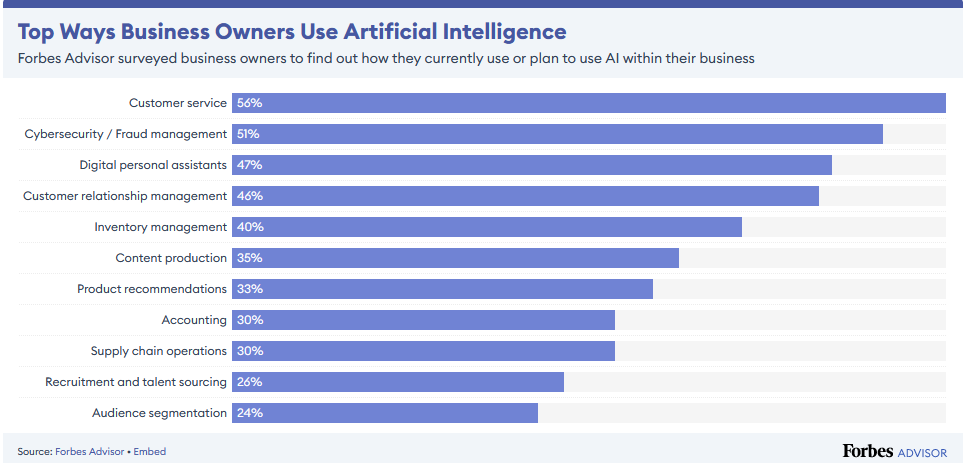Picture this. A powerful new addition to your team: A tireless collaborator that tackles complex tasks with efficiency, works alongside you on multiple projects, and augments your abilities to approach challenges wit creative problem-solving, strategic thinking, and building relationships. Introducing AI assistants – here to empower your potential and supercharge your impact.
As we embrace these digital partners, we are also opening the door to new possibilities and questions. What sort of responsibilities should we entrust them with? How do we stay true to our values and make sure that our member’s data stays safe? This blog encapsulates these overwhelming opportunities, scrutinizes the ethical puzzles, and helps you take a look at the competitive landscape of AI agents shaping the future.
Before we delve into it, let’s take a look at the current state of AI in different business segments.
The state of AI in business

Source: Forbes
Future trends and developments of AI agents
Imagine a world where customer service anticipates your needs before you even ask. This isn’t science fiction – it’s the rapidly evolving landscape of AI agents. As AI technology continues to break new ground, we’re on the cusp of paradigm shifts that will redefine the way businesses interact with their customers.
Personalized support and predictive assistance:
AI agents is poised to become a master of personalization. By analyzing vast amounts of data and employing cutting-edge algorithms, these systems will not only understand your preferences and past interactions, but also predict your needs proactively. Imagine a scenario where AI pre-emptively offers help with a product based on your usage patterns, or suggests solutions to potential issues before you even encounter them. This level of anticipation can significantly boost customer satisfaction and loyalty.
Turn Your Agents Into Super Agents
Seamless omnichannel experience:
The future of customer service is omnichannel; meaning a consistent and unified experience across all touchpoints. Whether you reach out via chat, email, social media, or voice, AI agents will seamlessly integrate, ensuring you receive the same level of personalized and efficient service, regardless of your preferred channel.
Emotionally intelligent interactions:
As AI matures, so will its emotional intelligence. Future iterations of AI agents will be adept at understanding and responding to the emotional undertones in your communication. This extends beyond simply recognizing frustration, happiness, or confusion – the system will tailor its interaction style to match your mood, fostering more empathetic and satisfying customer experiences.
The rise of autonomous problem solving:
While AI agents currently aid in resolving customer queries, the future holds the potential for these systems to handle a wider range of issues independently. This shift will free up human agents to focus on complex, high-value interactions, leading to increased operational efficiency and faster resolution times for customers.
AI meets emerging technologies:
The integration of AI agents with cutting-edge technologies like augmented reality (AR), virtual reality (VR), and the Internet of Things (IoT) will open exciting new avenues for customer support. Imagine AR providing step-by-step troubleshooting guides overlaid on your physical environment, or VR offering immersive product demonstrations. Additionally, IoT integration could empower AI to proactively address issues with connected devices, often before they become problems for you.
Continuous learning and adaptation:
The future of AI agents lies in its ability to continuously learn and adapt. These systems will be equipped with mechanisms to refine their responses based on new information, customer feedback, and evolving trends. This ensures that the support you receive remains relevant, effective, and aligned with your expectations.
Ethical considerations and transparency:
As AI becomes more ingrained in customer service, ethical considerations and transparency are paramount. Businesses must address concerns around data privacy, user consent, and the explainability of AI decisions. Building trust is crucial – ensuring AI systems are not just effective but also operate in a fair, ethical, and transparent manner.
4 Impactful ways to empower AI agents for personalized customer experience
While self-service and automation powered by AI are lauded for their ability to personalize customer experiences at scale, a crucial element often gets sidelined: the human touch. Countless articles advocate for leveraging technology, but fewer address the untapped potential of agents in fostering genuine human-to-human personalization.
Maximizing the potential of customer data: A 360-degree view
Many businesses hold a treasure trove of customer data, yet struggle to leverage it effectively. Imagine agents seamlessly personalizing interactions, going beyond names to anticipate customer needs. This requires equipping them with easy access to a unified customer profile.
A complete picture: beyond fragmented information
Forget piecing together information from various systems. Strive for a single, comprehensive view encompassing:
Current Interaction
- Did the customer use the IVR (Interactive voice response)?
- Have they contacted support previously about the same issue?
- What channels have they used to resolve their problem?
Customer Journey
- Customer lifetime value (how long they’ve been a customer)
- Past contact center interactions
- Purchase history
- Customer status or loyalty tier
- Previous support issues
Making data actionable
Present data in a clear and digestible format. Leverage AI-powered summarization to surface the most relevant information at the right time. This empowers agents to:
- Respond effectively to the current interaction.
- Anticipate future needs.
Example: A credit union agent assisting with a mobile app login issue can also see an upcoming payment and offer to process it. This addresses the immediate concern while anticipating a future need.
Building agent empathy: The soft skills advantage
Personalization thrives on empathy. Making customers feel acknowledged and valued fosters loyalty.
- Train agents in active listening and probing questions to understand customer needs.
- Provide real-life examples (good and bad) of personalized interactions, including their own.
Focus on soft skills training:
- How to ask insightful questions
- Active listening techniques
- Appropriate language for customer interactions
- Taking ownership and following through on issues
Investing in soft skills training yields significant returns by enabling agents to deliver more personalized experiences.
Empowering agents for flexibility and autonomy
While policies are crucial, excessive rigidity can hinder personalization.
- Equip agents to understand their decision-making authority.
- Encourage them to prioritize the customer’s best interests when appropriate.
Examples of agent autonomy:
- Taking ownership of a problem beyond standard procedures.
- Following up on issues or offering alternative communication channels.
- Empowering intelligent AI agents fosters a culture of personalized service that extends beyond individual interactions.
Meeting customers on their terms: Omnichannel support
Customers seamlessly switch between channels. A robust omnichannel strategy allows agents to personalize interactions across preferred channels.
Example: A customer needing support can switch from a call to text or email if their situation demands it.
A well-integrated omnichannel system empowers agents to provide a seamless and personalized experience regardless of the channel used.
Automate, improve, empower your customers with personalized AI agents
AI and empathy: The winning formula for personalized customer service
At Softweb Solutions, we recognize the power of human connection and the potential of AI to enhance customer service. We are at the forefront of implementing AI-powered solutions while keeping the human element at the core. Our experts are equipped with the latest tools and training to leverage AI effectively, enabling them to personalize interactions on a deeper level. This approach allows us to provide exceptional customer experiences that foster trust, loyalty, and a lasting positive brand impression.









